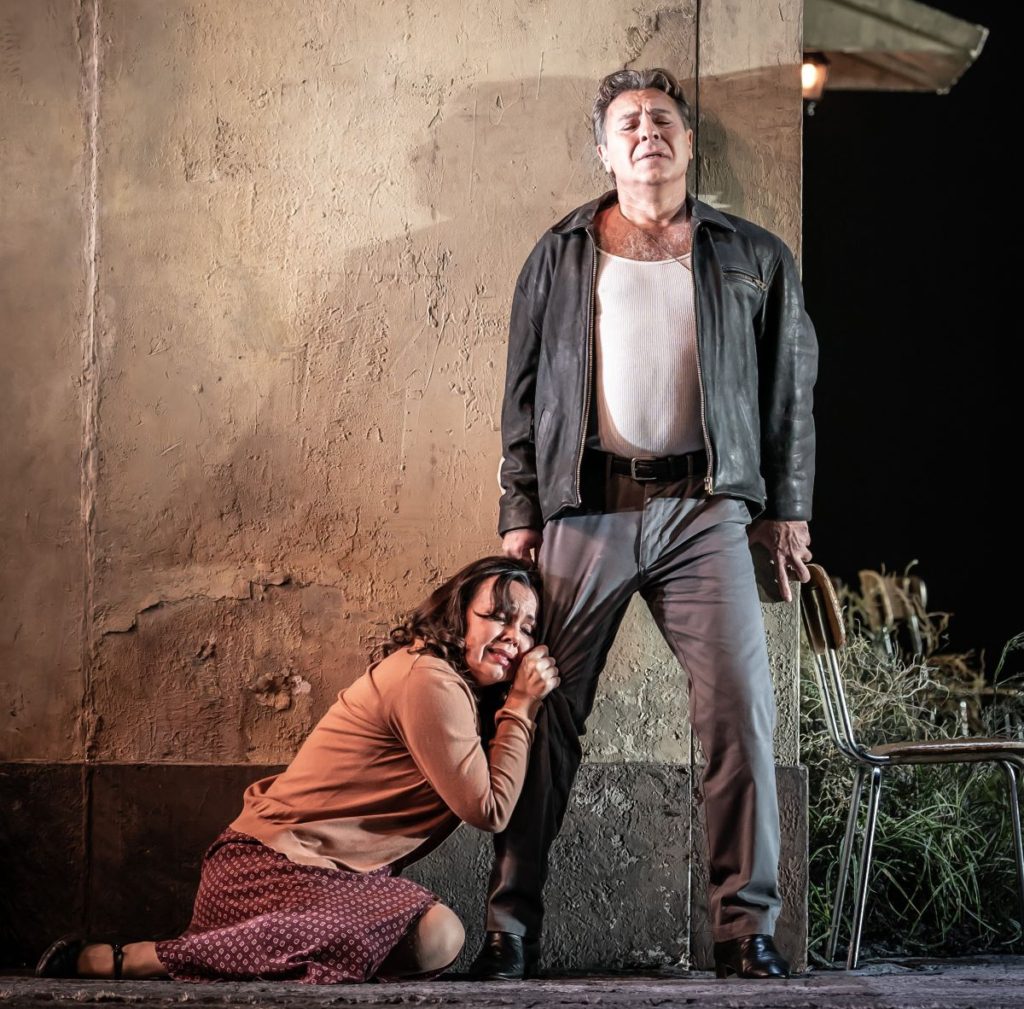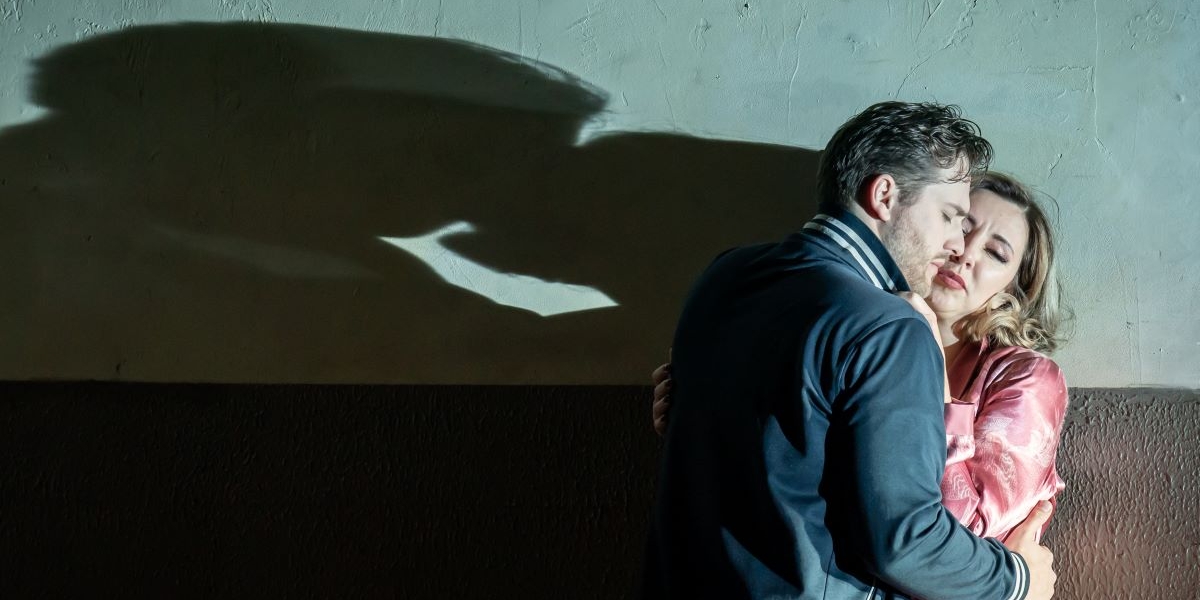Cavalleria Rusticana was a late entry for an 1888 competition for young Italian composers who had not staged a performance, to compose a one-act opera. Mascagni’s wife submitted it the day before the deadline! Cavalleria Rusticana was a winner. Inspired by Mascagni, Leoncavallo composed Pagliacci. They are usually staged together. These blood-and-guts passionate verismo stories, set in southern Italy, complement each other. This third revival of Damiano Michieletto’s Olivier award production interweaves both stories so convincingly that it is impossible to imagine them paired with anything else.
During Cavalleria, the stage revolves, posters advertise the evening’s entertainment – ‘Pagliacci’. Nedda hands out leaflets. Lucia’s baker (Silvio) takes one; the attraction is instant. During the intermezzo, Nedda passes the bakery, Silvio gives her bread and a scarf; their unstoppable love-affair begins. At the beginning of Pagliacci, Canio argues with his wife Nedda about the scarf. During the Pagliacci interlude, Santuzza reconciles with Lucia when she reveals her pregnancy.
Michieletto explains how Nedda meets Silvio; as a traveller, Nedda is only in town for a day: and why Santuzza is excommunicated – because she is unmarried and pregnant, adding an almost happy ending to Cavalleria; Turiddu will live through his child.
Generally, the translation works: except in Cavalleria, Alfio sings about horses and whips but enters in a car and in Pagliacci, the show starts at venti-tre ore (23.00) but the translation is ‘nine’ (21.00).
This is a fantastic show and the best production in London. It has everything, great music, singing, and drama. The house was packed!
Cavalleria starts at the end: Turiddu is murdered, the chorus shocked; Mamma Lucia, again sung by the incredible 82-year-old Elena Zilio, kneels in palpable grief over his body in front of her bakery (Panificio).
French/Italian tenor Roberto Alagna as Turiddu kick-starts with his offstage serenade, adding interesting ornamentation and wonderful long phrases. Alagna is phenomenal: he is 60, and still has an exciting, dramatic voice. He dominates and delivers. ‘Mamma quell vino é generoso’ as he says goodbye to his mother is heartbreaking. Alagna’s Turiddu implies the suicidal duel with Alfio is because he drank too much to mask guilty feelings instead of the usual foolhardy bravado.
Polish soprano Aleksandra Kurzak (Alagna’s real-life wife) as Santuzza sings some gorgeous pianissimo melting phrases – ah signor – during the Easter procession. Such is her guilt as a fallen woman, that she imagines the procession Madonna turning to accuse her. Kurzak, sounds luscious, vulnerable and destroyed by Turiddu’s abandonment, revealing deepest emotions in ‘Voi lo sapete’.

A highlight is the husband-and-wife duet. Sparks of searing intensity crackle between them. They are terrific stage animals; their duet is high-octave emotional passion, Santuzza desperate to keep Turiddu, he desperate to escape. Alagna’s Turiddu really does care for Santuzza, almost yielding yet still obsessed with Lola. Kurzak is broken; her immediate, but fatal spur-of-the-moment reaction to spill all to Alfio passing by, is understandable. Her intention was to separate Turiddu/Lola, not to have Turiddu murdered.
American mezzo Rachael Wilson convinces as Lola, with the perfect dusky, sexy tones and seductive looks to tempt Turiddu.
Greek baritone Dimitri Platanias as Lola’s husband Alfio is a brute. Vocally the top notes are shouted and not very pleasant.
Platanias reappears in Pagliacci as malevolent, dangerous Tonio, singing better than as Alfio. Tonio opens with the prologue – ‘si puo’, using good pianissimo and legato for ‘un nido di memorie’.
Alagna is a tough act to follow. Tenerife tenor Jorge de León makes his house debut. His Canio is a nasty, controlling, violent abuser. Therefore, knowing this, nowadays we have little sympathy for Canio’s famous aria ‘vesti la giubba’ (the broken clown forced to laugh on stage). León gives a moving rendition, although with too much vibrato and slightly lacking power. It triggers a mental breakdown where we see his mind inventing different onstage/offstage scenarios. This anticipates homicidal thoughts in ‘no! pagliacco non son’, when he unravels.
Russian soprano Anna Princeva’s Nedda uses the undulating movement in Stridono lassù as a sexy seductive calling card. She has learnt to cope with Canio’s rages, and being nasty is her coping mechanism to Tonio. Stuck between an abusive husband and a rapist, falling in love and running away is inevitable. Polish baritone Andrzej Filończyk has a bright warm voice. His passionate Silvio is convincing, as the love story evolves. Their love duet blends sumptuously.
Spanish tenor Mikeldi Atxalandabaso is outstanding as Beppe.
Poor Mamma Lucia! She loses her son, Turiddu in Cavalleria, and her star baker, Silvio, in Pagliacci!

